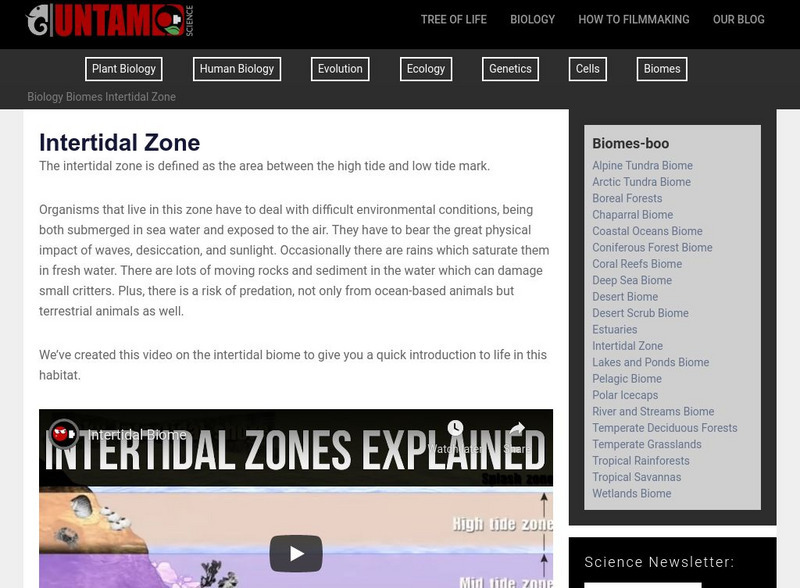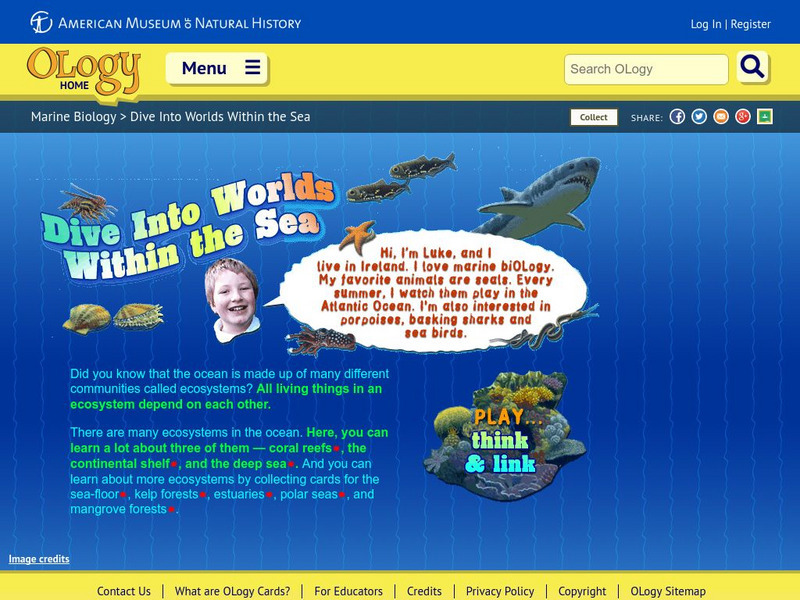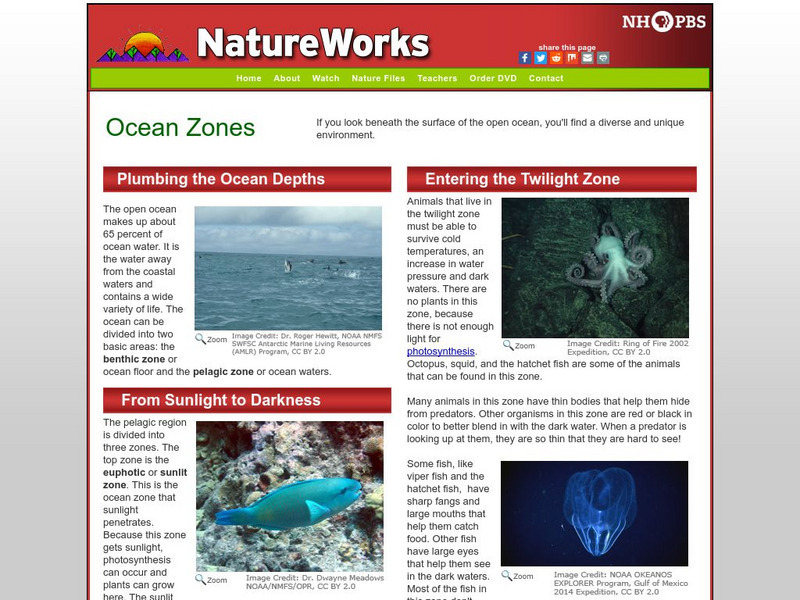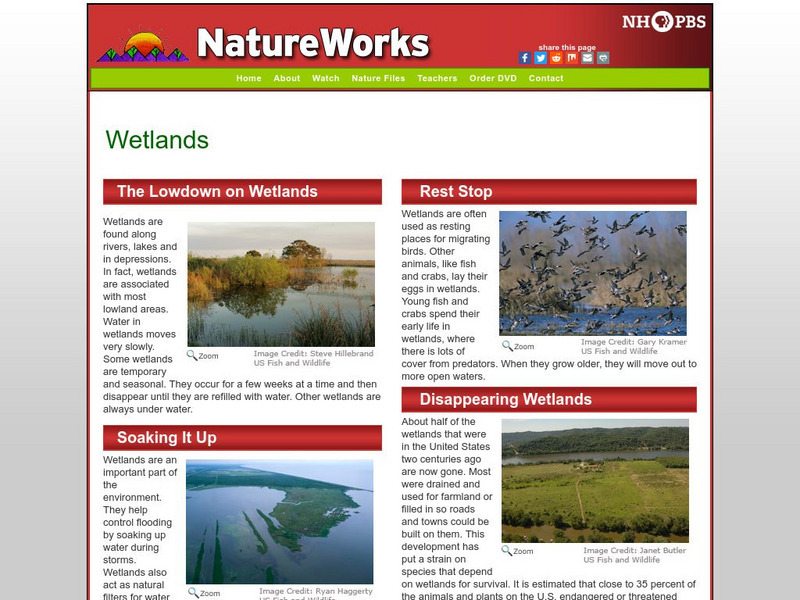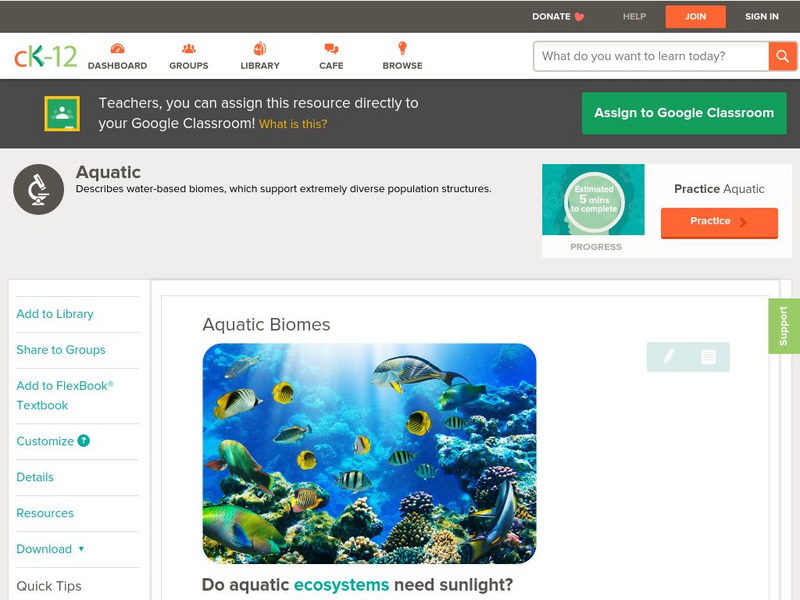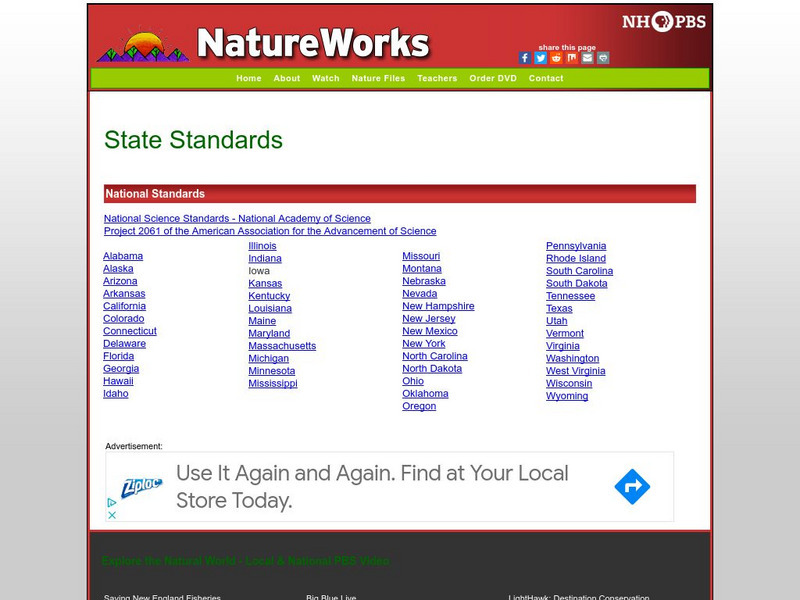NOAA
Noaa: Ocean Diversity Challenge [Pdf]
Read descriptions of organisms that live in the ocean. Locate the organisms on a poster based on their description.
The Wild Classroom
The Wild Classroom: Biomes
This excellent resource explores all of the biomes found on planet Earth! A side menu indicates the world's biomes and provides details on each. Colorful interactive maps, video clips, lesson plans, species profiles, and so much more...
Untamed Science
Untamed Science: Biology: World Biomes: Intertidal Zone: Aquatic Biome
Learn about the flora and fauna of the intertidal aquatic zone and the characteristics that describe this aquatic biome through reading and watching video clips. [6:42]
Untamed Science
Untamed Science: Biology: World Biomes: Pelagic Biome
Learn about the different zones of the open ocean, the pelagic biome, and what organisms call each zone home.
Other
Union of Concerned Scientists: Global Warming
This resource provides statistical evidence, backgrounders, FAQs, climate impact reports, and suggested solutions to the global problem.
Science Buddies
Science Buddies: Home Sweet Biome: How Do Plants Grow in Different Environments?
In this science fair project you will learn about biomes and how different climatic conditions affect plant growth. This can explain why some plants and animals are similar in different areas of the country, and in other parts they are not.
NOAA
Noaa: Estuaries 101 Middle School Curriculum Overview [Pdf]
The Estuaries 101 Middle School Curriculum is a multimedia curriculum focused on the theme "Estuaries & You." It includes a series of online activities for middle school students that highlight our nation's living laboratories, all...
CK-12 Foundation
Ck 12: Episd: Aquatic Biomes
[Free Registration/Login may be required to access all resource tools.] Students will recognize aquatic biomes and understand the adaptations necessary to survive in one.
NOAA
Noaa: Motion From the Ocean [Pdf]
Reel in some information about fish from the ocean. Then create a mobile with fish that you color.
Missouri Botanical Garden
Missouri Botanical Garden: How the Ocean Refreshes Itself
Watch the animated illustrations to see how the nutrients at the bottom of the ocean get circulated to the top. This upwelling is necessary in order to maintain a healthy ocean.
Other
Shark Watch
Shark Watch is a 3-in-1 multi-functional and multi-awarded ecotourism and conservation enterprise aimed to entertain and educate visitors.
California Academy of Sciences
California Academy of Sciences: Science in Action: Philippine Biodiversity Expedition
The Academy's expedition to the Philippines discovered unusual treasures at great depths.
Mocomi & Anibrain Digital Technologies
Mocomi: Corals and Coral Reefs
Discover interesting facts about coral reefs and what corals eat.
American Museum of Natural History
American Museum of Natural History: Dive Into Worlds Within the Sea
Think and Link to investigate three different ecosystem either the deep sea, coral reef or continental shelf. By connecting the dots students make a food chain to see how organisms in each habitat depend on each other.
Smithsonian Institution
National Museum of Natural History: Ocean Portal: Corals and Coral Reefs
Learn about corals and the importance of coral reefs to ocean ecosystems. Find out how reefs are created, what threats they face, and what kinds of conservation tactics are being used to protect and preserve them.
Other
An Aquatic Adventure
In this WebQuest, you must pick a type of water habitat to create a new aquarium, choose three animals that can coexist in this habitat and design your own aquarium.
Curated OER
Unesco: Costa Rica: Cocos Island National Park
Cocos Island National Park, located 550 km off the Pacific coast of Costa Rica, is the only island in the tropical eastern Pacific with a tropical rainforest. Its position as the first point of contact with the northern equatorial...
The Franklin Institute
Treasures@sea: Exploring the Ocean Through Literature
This extensive resource consists of learning activities that integrate language arts with oceanography. Each activity is based on one of seven books about the ocean and are written to be adaptable. Includes writing activities, games and...
PBS
Nh Pbs: Nature Works: Ocean Zones
Discover more about the underocean environment at this site that surveys animals, environmental factors such as light and temperature, currents, animals, plants, and the like.
PBS
Nh Pbs: Nature Works: Wetlands
Did you know that wetlands are frequently used as resting stops for migrating birds? This is just one of the many interesting facts found within this educational resource. This site features information on the characteristics, types,...
Science Education Resource Center at Carleton College
Serc: Two Types of Journaling Before Pond Study
During the lab, students investigate the interaction of living and nonliving environmental factors affecting a run off pond near the school.
CK-12 Foundation
Ck 12: Biology: Aquatic Biomes
[Free Registration/Login may be required to access all resource tools.] An overview of aquatic biomes.
Other
Us Epa: Buzzards Bay Project
Home page of the Buzzards Bay Project National Estuary Program. Contains links to mission statement, events/updates, bay & basin info, references to documents related to the organization, links to related sites, legislation, and...
PBS
Nh Pbs: Nature Works: Teacher's Guides
A wealth of resources connected to individual nature-related state standards can be found here. Information in a newsletter-type format is located under particular grade levels and is accompanied by teacher guides and short quizzes to...
Other popular searches
- Marine Ecosystem Food Chain
- Crude Oil Marine Ecosystem
- Marine Ecosystem Balance
- Marine Ecosystem Unit
- Marine Ecosystem Habitats
- Marine Ecosystem Underwater
- Illustrate Marine Ecosystem
- Marine Ecosystem Project
![Noaa: Ocean Diversity Challenge [Pdf] Activity Noaa: Ocean Diversity Challenge [Pdf] Activity](https://d15y2dacu3jp90.cloudfront.net/images/attachment_defaults/resource/large/FPO-knovation.png)
